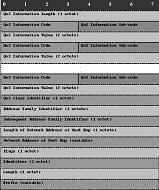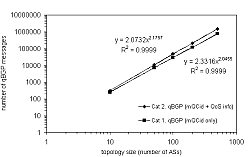 The
MESCAL solution for QoS delivery in the Internet adopts a hop-by-hop,
cascaded model of interactions between adjacent providers. Interactions
occur both at the service and IP layers. MESCAL controls the inter-domain
IP layer interactions with q-BGP, an enhanced version of the BGP
(Border Gateway Protocol), which is widely used today for best-effort
inter-domain routing. MESCAL envisioned a suitable and enhanced
BGP to convey QoS-related routing information across different domains,
with the aim of enabling the discovery, the selection, the enforcement
and the maintenance of QoS-aware routes at the IP layer. The
MESCAL solution for QoS delivery in the Internet adopts a hop-by-hop,
cascaded model of interactions between adjacent providers. Interactions
occur both at the service and IP layers. MESCAL controls the inter-domain
IP layer interactions with q-BGP, an enhanced version of the BGP
(Border Gateway Protocol), which is widely used today for best-effort
inter-domain routing. MESCAL envisioned a suitable and enhanced
BGP to convey QoS-related routing information across different domains,
with the aim of enabling the discovery, the selection, the enforcement
and the maintenance of QoS-aware routes at the IP layer.
MESCAL
has designed q-BGP in such a way it can support any inter domain
QoS delivery solutions that rely on an exchange of QoS information
(either at service or control layers). Two categories of solutions
groups have been identified. The first category is expected to require
only a QC identifier to be carried in q-BGP messages. The second
category requires, in addition to the QC identifier, that q-BGP
carries also a set of QoS performance characteristics. Therefore,
new attributes have been defined, mainly: QoS Service Capability
and two flavours of QoS_NLRI. MESCAL has specified how a q-BGP speaker
should process these attributes and proposed several new q-BGP route
selection processes able to take into account received QoS information
as additional inputs. Finally, MESCAL ensured that q-BGP is backward
compatible and continue to gracefully interoperates with classical
BGP.
As
far as the provisioning of the values of the q-BGP QoS performance
parameters is concerned, MESCAL distinguished two non-exclusive
provisioning modes: administrative- and dynamic-set modes. Obviously,
these modes differ in the time scales of their dynamic, which in
turn influences the frequency of the UPDATE messages.
 Simulations
have shown that injecting QoS information into BGP when coupled
with a QoS-aware route selection process results in the discovery
of better performing routes across meta-QoS-class planes compared
to using standard BGP. While the quantity of q-BGP messages is greater
than for plain BGP the results indicate that when scaled to Internet-sized
AS topologies there is only a three-fold increase in update messages.
The injection of static, administratively-set QoS information into
BGP can have a detrimental effect on QoS if pSLS capacities are
not engineered appropriately or if q-BGP route selection policies
are not carefully selected. Injecting dynamically measured QoS-info
may alleviate this but care must be taken to dampen route fluctuations
to avoid instabilities. Simulations
have shown that injecting QoS information into BGP when coupled
with a QoS-aware route selection process results in the discovery
of better performing routes across meta-QoS-class planes compared
to using standard BGP. While the quantity of q-BGP messages is greater
than for plain BGP the results indicate that when scaled to Internet-sized
AS topologies there is only a three-fold increase in update messages.
The injection of static, administratively-set QoS information into
BGP can have a detrimental effect on QoS if pSLS capacities are
not engineered appropriately or if q-BGP route selection policies
are not carefully selected. Injecting dynamically measured QoS-info
may alleviate this but care must be taken to dampen route fluctuations
to avoid instabilities.
Further
reading:
P. Levis, M. Boucadair, P. Morand, J. Spencer, D. Griffin,
G. Pavlou, P. Trimintzios, A New Perspective for a Global QoS-based
Internet, to appear in the Journal of Communications Software and
Systems, 4th quarter 2005. [pdf
document]
M.
Boucadair (Ed.), "QoS-Enhanced Border Gateway Protocol",
draft-boucadair-qos-bgp-spec-01.txt, Work in Progress, July 2005.
[link]
MESCAL
deliverable D1.3, "Final specification of protocols and algorithms
for inter-domain SLS management and traffic engineering for QoS-based
IP service delivery", Chapter 10, section 10.5. [link]
MESCAL
deliverable D3.2, "Final
experimental results: validation and performance assessment of algorithms
and protocols for inter-domain QoS through service-driven traffic
engineering",
Chaper 4. [link]
qBGP
demonstration: avi movie file of screenshots of qBGP in action in
the MESCAL testbed. [qbgp-demo.avi].
Note that this is a 35 MB file and and it requires
the TechSmith
Screen Capture Codec. |